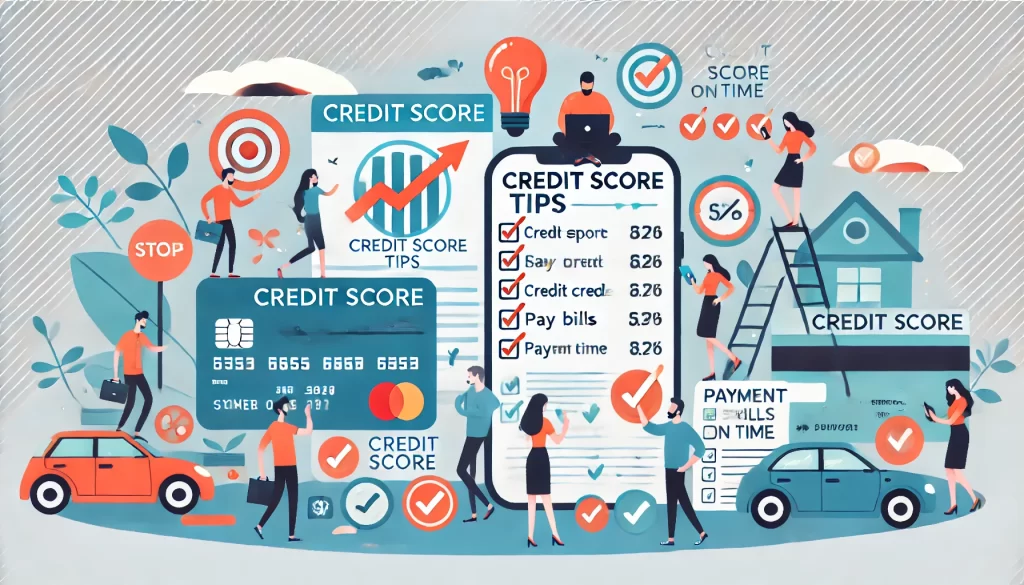Your credit score tells a story about your financial habits. It’s a key number that can help or hinder your financial goals. It’s like a silent judge that affects your life in big and small ways.
Want a new home, a reliable car, or more financial freedom? Improving your credit score quickly is crucial. It’s not just a game of numbers; it’s about changing your financial future.
Mastering credit score tips is vital for your financial health. Your credit score is based on several factors, with payment history being a big part. Paying bills on time is key.
Managing your finances can seem tough, but you have the tools to make it easier. Checking your credit reports and keeping your credit use low are good steps. These actions help build a strong financial profile.
Understanding how your actions affect your credit score is important. Factors like your debts, credit mix, and new credit applications play a role. To improve your score, focus on these areas carefully. With the right approach, you’re not just improving numbers; you’re building a life of financial freedom.
Improve credit score quickly is more than a goal; it’s a plan. Starting this journey might seem hard, but it’s about making smart choices and staying disciplined. It begins with paying bills on time, cutting unnecessary expenses, and correcting errors on your credit report. These actions can greatly improve your score and boost your confidence.
Why a High Credit Score Matters and How to Assess Yours
Knowing how a high credit score helps your finances is key. It makes getting loans easier and can lower what you pay back. Scores from 300 to 850 show how well you manage money. To start improving your score, you need to assess your credit score.
Importance of a Good Credit Score
A high credit score makes getting loans and credit easier. Scores of 800-850 can lead to lower interest rates, saving you thousands. For example, a small drop in the mortgage rate on a $400,000 home could save you up to $86,347.
Also, better scores help you get credit cards with more rewards. This is why improving your score is so important.
First Steps: Assessing Your Credit Reports
Start by getting credit reports from Equifax, Experian, and TransUnion. These show your payment history and how much credit you use, which affects your score. Payment history is 35% of your score.
It’s smart to check these reports often with soft inquiries. These don’t hurt your score. This way, you can fix any mistakes and use credit building strategies early.
Looking at your credit reports helps you see how your efforts to improve your score are working. Being smart about assessing credit score issues is key to good credit health.
Credit Building Strategies for Timely Bill Payments
When it comes to improving your credit score, paying bills on time is key. This can make up to 35% of your FICO score. Timely bill payments are crucial for anyone looking to raise their credit score.
Automating your payments is a smart move. It ensures you never miss a due date, keeping your payments consistent. This is a great way to improve your credit score by showing a steady payment history.
Consider using your credit card for monthly bills. This makes managing money easier and helps build your credit history. Paying off these charges fully each month helps avoid interest and shows you’re responsible with credit.
Using a detailed filing system and setting reminders can help you stay on track. This keeps your finances in order and supports ways to boost your credit score.
Staying informed about credit score enhancement techniques can motivate you to keep up with your finances. It’s important to check and adjust these strategies as your financial goals change. This ensures your efforts to improve your credit score are effective.
Credit Score Tips for Optimal Credit Utilization
Improving your credit utilization is key to a high credit score. It affects 30% of your FICO score. Using credit utilization techniques wisely boosts your creditworthiness and financial flexibility.
Understanding Credit Utilization
Credit utilization is the ratio of your credit card balances to your limits, shown as a percentage. Experts say to keep this under 30% for a good score. For the best scores, aim for single digits. This ratio shows lenders how responsible you are with money.
Strategies for Reducing Balances
To manage credit card balances well, try increasing your credit limit and lowering your balances. Ask your issuers for a higher limit without spending more. Using balance transfer cards or personal loans to pay off high-interest debts also helps. These steps are key for a better credit score.
Pay your credit card balances more often. Paying off the full balance each month keeps your utilization low. This keeps your credit score up and interest down.
Watch your credit usage closely and set alerts for high levels. This way, you can catch and fix overutilization early. It keeps your finances healthy and your credit score strong.
In summary, lower your credit utilization by increasing your limits and reducing your balances. By following these tips for better credit score improvement, you’ll grow your finances and build trust with lenders.
Ways to Boost Credit Score While Managing New Credit
Improving your credit score needs careful planning, especially when opening new credit accounts. It’s important to know how to limit credit inquiries and manage new credit accounts well.
The Impact of Credit Inquiries
Applying for credit adds a hard inquiry to your report, which can lower your score. If you apply for many things in a short time, the effect gets worse. To limit credit inquiries, only apply for credit when you really need it.
When looking for a car or home, try to apply within 14 to 45 days. Scoring models usually count these inquiries as one, which helps your score less.
Navigating New Credit Accounts Wisely
Understanding how new credit accounts affect your credit mix is key. They can improve your credit mix, which is 10% of your FICO® Score. But, keep hard inquiries low and manage your new accounts well.
Keeping low balances and paying on time can also help your score. Using these improve credit score strategies wisely is about discipline and being aware. Check your credit report often to see how your actions change your score. With good management and smart planning, your credit score can get better over time.
Conclusion
The path to a better credit score starts with a detailed credit score evaluation. It also involves a commitment to implementing credit improvement strategies. Paying bills on time is key, as it affects 35% of your score. Keeping your credit use below 30% is also crucial.
Building a strong credit history means managing your accounts wisely. Be careful when opening new credits. Closing old accounts might seem good, but it can hurt your credit score. This is because it can lower the average age of your accounts and your credit history length.
Opening new accounts too quickly can also be a problem, especially before applying for big loans. These actions can affect your credit score, which lenders look at to see if you’re creditworthy.
Our credit choices today affect our financial future. Late payments can stay on your credit report for up to seven years. But, by managing your credit well, you show lenders you’re reliable and consistent.
By following these tips and keeping an eye on your credit, you can slowly improve your score. This can lead to better terms and lower interest rates on loans in the future.






